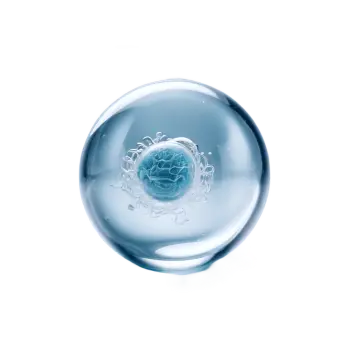Quick version
If you are trying to get pregnant, blood tests can provide important insight into your fertility. Here are some of the most important tests:
- FSH: Helps stimulate the ovaries. High levels can indicate a reduced ovarian reserve.
- LH: Triggers ovulation, the most fertile time in your cycle.
- Estradiol: Important for ovulation and the growth of the uterine lining.
- AMH: Indicates ovarian reserve. Low levels mean fewer eggs, but it doesn't necessarily mean you can't get pregnant.
- Progesterone: Important for maintaining a pregnancy.
- Prolactin: High levels can disrupt ovulation.
- Thyroid Hormones (TSH, T4, T3): Important for hormone balance and fertility.
When is the best time to get pregnant?
The best chance of getting pregnant is during the days around ovulation, usually day 14 in a 28-day cycle.
Tips to increase your chances:
- Have intercourse every day during the fertile period.
- Track your cycle using ovulation calculators.
- Take care of your health with a good diet and exercise.
- Be aware that fertility decreases with age.
- Explore options like insemination or IVF if you are not in a heterosexual relationship or have fertility issues.
With insight into your hormonal balance, you can better understand and support your fertility. No matter where you are in the process, it's important to be patient and take care of both your physical and mental health.
Getting pregnant – 7 blood tests that can provide insight into your fertility
There are several hormones and markers that are important for fertility, and a fertility test can help identify potential issues early on, while results within normal ranges can offer peace of mind when you are trying to conceive. Here are some of the most common blood tests that you, as a woman, can consider to gain more insight into your fertility:
FSH (Follicle Stimulating Hormone)
FSH helps stimulate the ovaries to produce eggs. Elevated FSH levels can indicate a decreased ovarian reserve and affect your chances of getting pregnant.
LH (Luteinizing Hormone)
LH plays a central role in ovulation. A sharp increase in LH levels triggers ovulation, which is the most fertile time in your cycle. A blood test can indicate whether your LH levels are normal and if ovulation is occurring as expected.
Estradiol (E2)
Estradiol is the primary form of estrogen and is crucial for healthy ovulation and the growth of the uterine lining. Low or high levels of estradiol can affect your fertility and thereby your chances of becoming pregnant.
AMH (Anti-Müllerian Hormone)
AMH levels provides a good indication of your ovarian reserve, which refers to how many eggs remain in the ovaries. This is particularly important if you are trying to conceive after the age of 35, as the ovarian reserve naturally decreases with age. Low AMH levels can indicate that there are fewer eggs remaining in the ovaries, which can affect your chances of becoming pregnant.
However, it’s important to understand that even though low AMH levels can indicate a reduced ovarian reserve, it doesn’t necessarily mean that a woman cannot become pregnant. AMH is primarily a measure of the quantity of eggs, but it doesn’t provide much information about the quality of the eggs. Many women with low AMH levels can still become pregnant, especially if the egg quality is good. Decisions regarding treatments or further investigations based on AMH levels should always be made in consultation with a doctor, who can provide advice based on a comprehensive view of your fertility and health.
Progesterone
Progesterone is important for maintaining a pregnancy and is ideally tested in the luteal phase (after expected ovulation). Low progesterone levels can make it difficult to become pregnant or maintain a pregnancy.
Prolactin
High levels of prolactin can disrupt ovulation. Prolactin is best known as the hormone responsible for milk production, but it can sometimes be elevated for other reasons and may affect your ability to become pregnant.
Thyroid samples
The balance of thyroid hormones is important for your fertility, so it is good to test TSH, T4 and T3. Regardless of whether the thyroid gland is overactive or underactive, it can affect your chances of getting pregnant.
When is the best chance of getting pregnant?
The greatest chance of getting pregnant occurs around the time of ovulation. This usually occurs around day 14 of a regular 28-day cycle, but can vary depending on the length of the cycle. The most fertile days are two to three days before ovulation and the day of ovulation itself.
Getting pregnant – 4 tips
In addition to testing your hormones, there are several things you can do to increase your chances of getting pregnant quickly. But remember to be patient, it takes a different amount of time for all people and depends on individual circumstances such as health, age and lifestyle:
1. Have intercourse regularly
To maximize your chances of getting pregnant, you should have intercourse every day during your fertile period, which is the two to three days before ovulation and the day of ovulation itself. It is during this period that the chance of becoming pregnant is greatest, as the egg is fertilizable for up to 24 hours after ovulation, and sperm can survive in the woman's body for up to five days.
2. Keep track of your bike
Use tools like our ovulation calculator or fertility apps to understand when you are most fertile.
3. Take care of your health
Healthy habits, such as a balanced diet, regular exercise and reducing stress, can all increase your chances of conceiving.
4. Have knowledge about age and fertility
The chance of getting pregnant naturally decreases with age. It is therefore important to be aware of how age affects fertility and consider seeking professional help if you have been trying to conceive without success for over a year (or six months if you are over 35).
5. Explore options for insemination or IVF
If you are not living in a heterosexual relationship or if you are undergoing IVF (in vitro fertilization), there are other ways to get pregnant. For same-sex couples, single women, or couples where one partner has fertility problems, insemination with donated sperm or IVF may be suitable options. It is important to consult with a fertility clinic or specialist to get information about the options that best suit your situation. These methods require careful planning and medical monitoring to maximize the chance of becoming pregnant.
With insight into your hormonal balance and knowledge of how these hormones affect your fertility, you can support your values if necessary. Blood tests such as FSH, LH, estradiol, AMH, and progesterone, as well as thyroid tests, can give you a clearer picture of your fertility.
Whether you have just started trying or have been trying for a long time, it is important to be patient and take care of both your physical and mental health during the process.






















